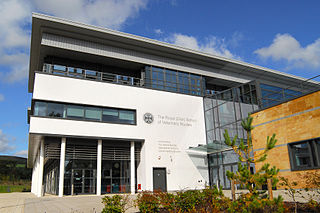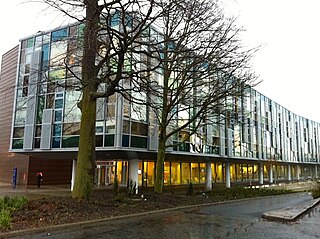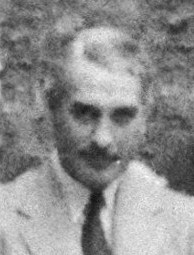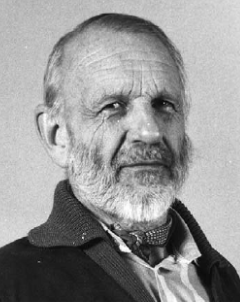Related Research Articles
Degree abbreviations are used as an alternative way to specify an academic degree instead of spelling out the title in full, such as in reference books such as Who's Who and on business cards. Many degree titles have more than one possible abbreviation, with the abbreviation used varying between different universities. In the UK it is normal not to punctuate abbreviations for degrees with full stops, although this is done at some universities.
Sir Robert Brian Heap is a British biological scientist.

The Royal (Dick) School of Veterinary Studies, commonly referred to as the Dick Vet, is the University of Edinburgh's vet school. It is part of the College of Medicine and Veterinary Medicine.
Harold James Plenderleith MC FRSE FCS was a 20th century Scottish art conservator and archaeologist. He was a large and jovial character with a strong Dundonian accent.
Dr Colin Sinclair Mayne is an agricultural scientist from Northern Ireland. Since February 2009, he has been the departmental scientific advisor for Northern Ireland's Department of Agriculture and Rural Development and the director of Sustainable Agri-Food Sciences at the Agri-Food and Biosciences Institute.
Edward Howel Francis, BSc, DSc, FRSE, FGS was a British geologist and Emeritus Professor of Earth Sciences at the University of Leeds. He was President of the Geological Society of London from 1980 to 1982.

John Roger Speakman is a British biologist working at the University of Aberdeen, Institute of Biological and Environmental Sciences, for which he was Director from 2007 to 2011. He leads the University's Energetics Research Group, which is one of the world's leading groups using doubly labeled water (DLW) to investigate energy expenditure and balance in animals. Between 2011-2020, he was a '1000 talents' Professor at the Institute of Genetics and Developmental Biology, Chinese Academy of Sciences, in Beijing, China, where he ran the molecular energetics group. In 2020 he moved to the Shenzhen Institutes of Advanced Technology, Chinese Academy of Sciences in Shenzhen, China where he works at the Center for Energy Metabolism and Reproduction and Head of the Shenzhen Key laboratory of Metabolic Health.
Joseph Fairweather Lamb FRSE (1928–2015) was a 20th-century Scottish physician, who was emeritus Professor of the Chandos Chair of Physiology at the University of St Andrews.
The Moredun Research Institute is a scientific research institution based at the Pentlands Science Park, in the Bush Estate area of Midlothian, Scotland. It conducts research into diseases of farm livestock and the promotion of animal health and welfare.
Sir David Paton Cuthbertson, CBE, FRSE was a Scottish physician, biochemist, medical researcher and nutritionist who was a leading authority on metabolism. The Rowett Research Institute became one of the world's leading centres for animal nutrition research under Cuthbertson's leadership (1945–65).

The Roslin Institute is an animal sciences research institute at Easter Bush, Midlothian, Scotland, part of the University of Edinburgh, and is funded by the Biotechnology and Biological Sciences Research Council.
Sir Kenneth Lyon Blaxter FRS PRSE FIBiol was an English animal nutritionist.
William Stirling MD LLD DSc FRSE, was a Scottish physiologist. He served as professor of physiology and was a founder of the physiology department at the Victoria University of Manchester.

Alan William Greenwood CBE FRSE was a Scottish zoologist and geneticist, who helped pave the way to creating Dolly the Sheep. He served as Director of the Poultry Research Centre from 1947 until 1962.
Thomas John Jehu was a British physician and geologist. The Jehu-Campbell Fossil Collection at the University of Edinburgh was donated by Jehu in combination with Robert Campbell and is now the main component of their “Highland Border Series” of fossils. Many of the fossils come from the Aberfoyle area.

Professor David Grainger Marcus Wood-Gush FRSE was a South African-born animal geneticist and ethologist based for most of his professional life in Edinburgh. He was an expert on animal behaviour and academic author in this field. He was one of the first to study the impacts of factory farming. He advocated the study of animal behaviour to gauge what implied "humane treatment" for different species, and tried to balance these factors against economic viability for the farmer. He looked at the impact of stress upon animals and held that animals should be treated as individuals not as a "commodity". In these studies he concluded that food supply was the essential factor in controlling animal behaviour.
Alistair B. Lawrence is an ethologist. He currently holds a joint chair in animal behaviour and welfare at Scotland's Rural College and the University of Edinburgh.
Eleanor Mary Riley was Director of the Roslin Institute, Dean of Research at the Royal (Dick) School of Veterinary Studies, and professor of Immunology at the University of Edinburgh. Her research focusses on understanding the immune response of the host to malaria and other diseases using human data and mouse models.
Hugh Paterson Donald (1908–1989) was a New Zealand-born, British biologist, noteworthy as an important contributor to Peter Medawar's research on skin grafts.
Grahame Bulfield, CBE, FRSE, Hon FRASE is an English geneticist, vice-principal and Emeritus Professor of Genetics at the University of Edinburgh. He is best known as the former director and chief executive of the Roslin Institute, Edinburgh, when in 1996 the research group led by Ian Wilmut first cloned a mammal from an adult somatic cell, a Finnish Dorset lamb named Dolly.
References
- ↑ Helmut Opitz (2002). World guide to scientific associations and learned societies (8 ed.). p. 232. ISBN 3-598-22250-5.
- ↑ [https://www.bsas.org.uk/about/our-team Maggie Mitchell, CEO British Society of Animal Science]
- ↑ [https://www.bsas.org.uk/news/elizabeth-magowan-appointed/ Elizabeth Magowan, President, British Society of Animal Science]
- 1 2 3 Ian J. Lean, Chairman of the Editorial Board (2006). "Foreword". Animal Science. 82 (6): 763–764. doi: 10.1017/ASC2006114 .
- ↑ "Press Releases". BSAS. Archived from the original on 13 February 2006.
- ↑ "Sir John Hammond Award". BSAS. Archived from the original on 21 February 2010.